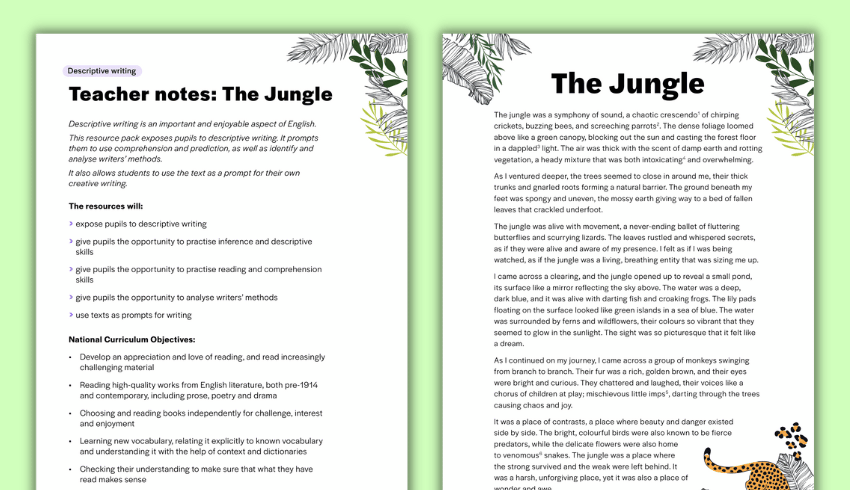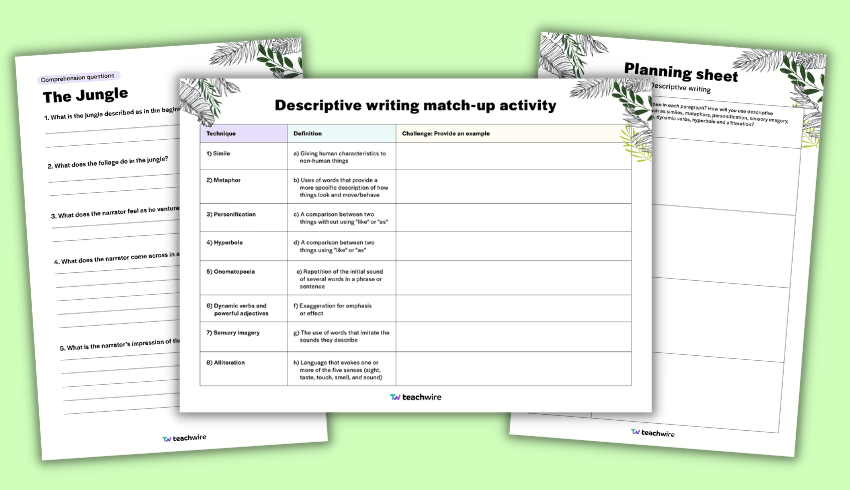Use these Year 7 English worksheets, teacher notes and PowerPoint to help pupils get to grips with descriptive writing.
Descriptive writing is an important and enjoyable aspect of English. These free downloadable worksheets are perfect for KS3 English lessons and cover two sessions of content.
Use the descriptive text, themed around the jungle, as a prompt for descriptive writing. The accompanying resources will help students develop their own creative writing and give them the opportunity to practise:
- comprehension
- prediction
- analysing writers’ methods
The resources will also expose pupils to a wide range of descriptive writing techniques. They’ll learn how to use texts as prompts for writing.

Contents of Year 7 English worksheets pack
- ‘The Jungle’ text with vocabulary definitions
- PowerPoint teaching slides
- Comprehension worksheets (questions and answers)
- Descriptive writing match-up activity sheet
- Planning sheet for writing task

Session 1
In the first session pupils will read the jungle-themed descriptive writing text, before trying a descriptive writing match-up activity. This involves matching techniques and descriptions before finding examples from the text.
Next pupils can fill out the comprehension questions worksheet, using answers from the text to justify their answers.
Pupils will then annotate a section of the text, identifying writing techniques and the effects these create.
Now it’s time to think about whether or not the writer has created a vivid and exciting description of the jungle, before writing their own What How Why paragraph about it. A model answer and scaffolding is provided in the download to help.
Session 2
In the final session students will recap the descriptive writing techniques you talked about last session before planning their own descriptive writing piece. They can use the included planning sheet to help them do this.
National curriculum objectives
- Develop an appreciation and love of reading, and read increasingly challenging material
- Read high-quality works from English literature, both pre-1914 and contemporary, including prose, poetry and drama
- Choose and read books independently for challenge, interest and enjoyment
- Learn new vocabulary, relating it explicitly to known vocabulary and understanding it with the help of context and dictionaries
- Check understanding to make sure that what they have read makes sense
- Know how language, including figurative language, vocabulary choice, grammar, text structure and organisational features, presents meaning
- Study setting, plot and characterisation, and the effects of these
- Write accurately, fluently, effectively and at length for pleasure and information through stories, scripts, poetry and other imaginative writing
Bhamika Bhudia (@MissMika_Eng) is a head of English at a mixed comprehensive secondary school in London. You can also download Year 8 English worksheets from Bhamika. We also have more descriptive writing lesson ideas and KS3 creative writing resources for teaching plot and setting.














